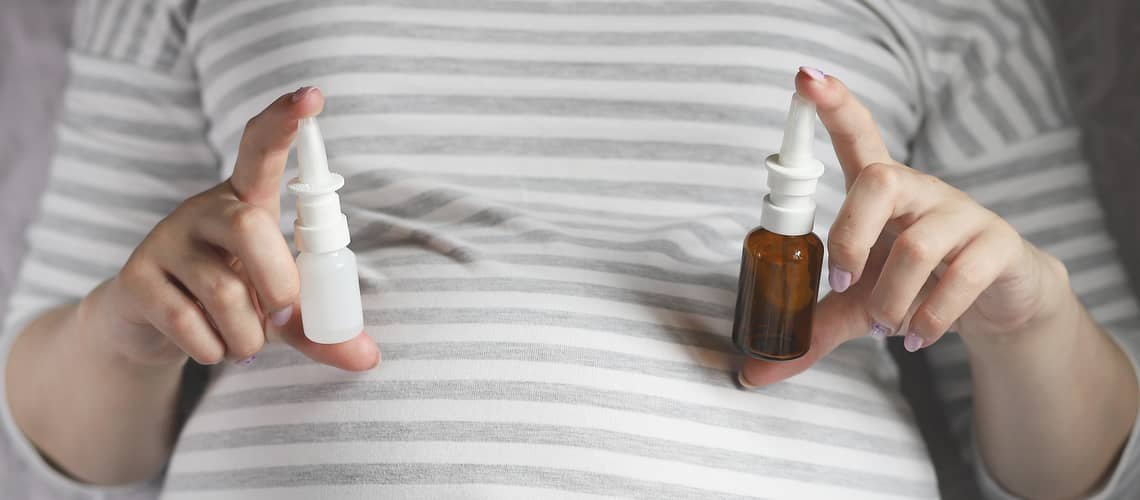
Spray and drops for the nose during pregnancy. What for a runny nose for pregnant? Steaming over salt water also helps
A cold, as a manifestation of an allergy, cold or other disease that has taken root in the human body, can often surprise at the least expected moment. During pregnancy, a woman's body works at full throttle in order to protect the developing fetus, even at the expense of the mother's own immunity. This is also why pregnant women are much more susceptible to common diseases such as colds and flu. But the so-called is also very widespread. pregnancy cold. An inherent, and very annoying, part of all the listed states of immune disturbance is a stuffy nose, which often leads to headaches and sleepless nights.
Normally, in such a helpless moment, a person would reach for medicines in the form of drops or spray, but are nasal drops safe during pregnancy? What about nasal sprays and what alternative treatment methods can pregnant women try to beat the common cold? You will find relevant answers to all these questions in the following lines of our article.
Nasal drops and spray during pregnancy - yes or no?
The first sign of a cold is most often reflected in a stuffy nose. Already with this symptom, many people lose patience and nerves, because it seems that it cannot be eliminated in any way and its persistent consequences affect the daily life of the infected.
However, few people realize at that moment that the nasal mucosa creates a kind of obstacle between the virus and the direct path into the body by such an unpleasant blockage. That is, precisely by creating an excessive amount of secretion - snot - and blood circulation, it prevents simple penetration of the virus into the entire human body.
A natural solution to blocked nasal mucosa is the application of nasal drops or spray, but pregnant women should be careful with this treatment method. The mentioned preparations should definitely be used only after consultation with a gynecologist, who will rule out any negative effect of a specific drug on the developing fetus. However, even after they are prescribed, the instructions limiting the duration of treatment with drops or nasal spray must be followed. Long-term use of such medications can lead to permanent damage to the nasal mucosa.
The appropriate period of use of such drugs during pregnancy is a maximum of three days. Subsequently, it is necessary to discontinue this treatment method for a few days. An overdose of nasal sprays and drops can lead not only to the body's dependence on the substances contained in the medicine, but also to birth defects in the child itself.
Nasal drops and sprays work on the principle of narrowing the blood vessels and tissues in the nasal cavities, which expand due to colds, allergies or the common cold of pregnancy and thus create an unpleasant blockage.
Nasal sprays and drops, which are commonly available in our pharmacies and act locally, do not pose any risk to pregnancy, but their safe use depends to a large extent not only on the length of time of use, but also on the necessary compliance with the prescribed dose and on their composition.
Common nasal sprays contain the substance oxymetazoline, which is 100 percent safe for pregnant women. Also thanks to this substance, it is possible to apply, for example, the product Nasivin, which does not cause any complications during pregnancy.

What preparations are not recommended during pregnancy?
It has become a kind of customary "rule" among pregnant women to treat pregnancy runny nose and stuffy nose with medicines intended for infants and small children. It is often the case that if the drug is suitable for small children, it logically cannot cause a risk during pregnancy. Despite this logical deduction of the suitability of taking medicines during pregnancy, pregnant women should consult their gynecologist about individual medicines.
However, there are also preparations for colds and stuffy noses, or sprays and drops in the nose, which are not suitable for pregnant women. Among them we include, for example, the drug Orinox, which was originally intended for people older than 12 years. In connection with this medicine, there may be potential effects that negatively affect the condition of a pregnant woman.
So, Orinox may not directly affect the fetus itself, but it may indirectly affect its development by having a negative effect on the health of the mother. Sinupret nasal drops should also not be used during pregnancy or while breastfeeding. In the most extreme situations, in connection with this drug, it must be evaluated whether its level of benefit for a pregnant woman outweighs the level of risk.
What about a cold during pregnancy?
In addition to safe available drugs, such as Olynth, Muconasal or Otrivin nasal drops and sprays, it is also advisable to try other, alternative treatment methods, which, due to regularity, can lead to optimistic results in terms of eliminating nasal sinus congestion.
Especially in the first trimester of pregnancy, when the use of any chemical-based drugs is not recommended, pregnant women should give a chance to other forms of cold treatment. First of all, it is necessary to observe the basic principles that apply in the case of any respiratory disease.
A pregnant woman should allow herself enough rest in bed, while it is advisable to ventilate the individual rooms used often for a short time. Compliance with hygiene is a matter of course. However, the most important factor is the supply of a sufficient amount of fluids and vitamins in natural form. Vitamins should therefore come from fruits and vegetables, which means that any dietary supplements and vitamin preparations can only be consumed after consulting a gynecologist.
A classic nasal rinse with salt water acts as a quick remedy for moistening and washing out germs from the nasal mucosa. A saline solution for the nose works in a similar, but somewhat simpler way, which is in the form of a nasal spray, but does not contain chemical substances based on medication. It is therefore one of the safest ways to cure a cold during pregnancy.
Another classic method used to treat a stuffy nose is sinus steaming during pregnancy. The most suitable time for steaming is the time before bed, when a stuffy nose could complicate the ability to achieve a full-fledged sleep. A hot shower, which in a certain way fulfills the function of steaming during pregnancy, can also help to relax the nasal cavities to a small but significant extent.

Nasal sprays and drops in pregnancy - experience
There is a lot of advice on discussion forums about what really helps with a cold in pregnancy. While steaming and nasal saline solution helped some women, others had to reach for safe drug-based options. Among them, they included drops and nasal sprays Olynth, Otrivin and Nasivin.
However, many women pointed out that the action of the listed drugs is individual, and therefore it is good to start first with alternative forms of treatment, such as steaming and rinsing the nasal cavities with salt water. It is advisable to discuss the further use of medicines with a gynecologist, who, based on the constantly updated anamnesis of the pregnant woman, can determine the correct and fast method of treatment.
Questions and answers - FAQ
If you did not find the information you were looking for in the previous paragraphs of our article on the suitability of nasal sprays and drops during pregnancy, give our question and answer section a chance. In case you don't find them there either, use our comments section. We try to respond to your suggestions and questions as soon as possible.
Will eating spicy food help with a cold during pregnancy?
Is frequent nasal congestion normal during pregnancy?
Are there preparations that I can use for a long time for a stuffy nose?
Pridať komentár





